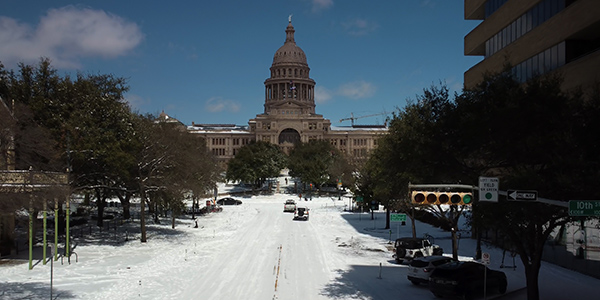ERCOT said reserves had been restored and declared a return to normal conditions Friday morning, ending an operational nightmare that began around midnight Sunday and left more than 4 million Texans without power at its peak.
The Texas grid operator said it had not required any additional outages Thursday night to maintain the balance between supply and demand and that only a few generating units tripped.
ERCOT dropped down from its level 3 energy emergency alert (EEA) at 9 a.m. CT Friday, saying the system was recovering and rotating outages had ended. An hour later, it moved to EEA Level 1, ending the latter alert 35 minutes later.
“We have enough generation on the system that folks are getting their power restored at a very regular clip,” CEO Bill Magness said during ERCOT’s daily media briefing.
System load neared 58.5 GW Friday morning, the highest it’s been since Sunday night. As the severe weather swept through Texas that night, staff saw about 40% of the system’s generation rapidly drop offline, forcing ERCOT to call for an immediate load shed. (See related story, ERCOT: Grid was ‘Seconds and Minutes’ from Total Collapse.)
ERCOT had as much as 45 GW of capacity offline at one point. By 7:30 a.m. Friday, 34 GW of generation, comprising 20 GW of thermal generation and 14 GW of renewable resources, remained on forced outage.
More than 36,500 customers were still without power Sunday, according to PowerOutage.US, down from 170,000 on Friday. The remaining outages are likely because of ice damage on the distribution system, large industrial facilities that voluntarily went offline or because load-shed areas need to be restored manually, ERCOT said.
Magness acknowledged the “immense human suffering we saw throughout this event.”
“Watching the heartbreak was terrible,” he said. “The bottom line, while fellow Texans had to experience this, we made a tough decision. The choice we had was to manage as best we could with 60% of the supply we had left. The only way we could do that was to reduce demand, and the only way we could do that was with outages.
“The outages served a purpose, as difficult as it was. Doing nothing was not really an option,” Magness said.
SPP has also returned to normal operations for its entire 14-state balancing authority area, saying it ended conservative operations at 10 p.m. Saturday. The RTO said it had enough generation to meet demand and available reserves and that it did not foresee extreme or abnormal threats to reliability.
The grid operator called off an EEA 1 Friday morning, five minutes shy of 15 complete hours. SPP declared the alert at 6:25 p.m. CT Thursday and ended it at 9:20 a.m. Friday.







